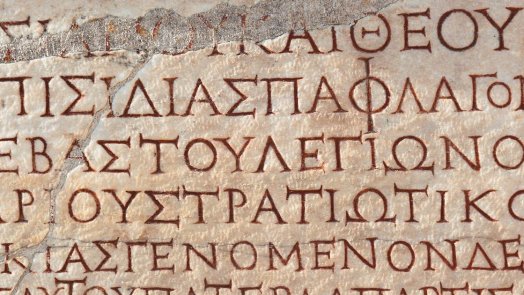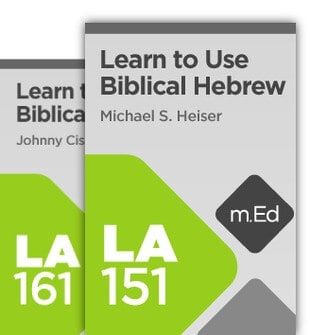I like to say to students that, in ancient Greek, verbs are where the action is. It’s a tongue-in-cheek acknowledgement that, of course, verbs are doing words, but also that verbs are centrally significant for the way that ancient Greek functions...
Jesus Christ, the most profound teacher to ever walk the earth, selected the tiny mustard seed to use as an illustration in his teachings. He did so multiple times and to various effects. In all three of the Synoptic Gospels, Jesus utilized this...
Watch Mark Ward’s full interview with Jonathan Leeman on the theology of love. Love is the most important commandment in the Bible. And the second most important. On love for God and neighbor hang both testaments. And at the center of the Bible...
This is the second article in a two-part series dealing with the common myth that Greek is the most precise language known to mankind. (Article one here.) I’d like to look at a few more examples of imprecision in the Greek of the New Testament...
Galatians 2:16 reads, “But knowing that a human is not justified from works of the law but through pistis Iesou Christou, we also trusted in Jesus Christ in order that we might be justified from pistis Christou and not from works of the law because...
I spent a significant portion of my twenties reading productivity blogs, especially those recommending the latest cool apps that promised to make my work umpteen-percent better/faster/easier. Until I realized one day that the time I was spending...
Dependent adverbial clauses are a common feature of Koine Greek, generally categorized based on the kind of content conveyed (e.g., conditional, comparative, spatial, temporal, reason/result, etc.). While many spatial and temporal adverbial clauses...
Plenty of Bible interpreters treat New Testament Greek the way my three-year-old girl treats my one-year-old boy: with well-meaning, blundering over-attention that ends up making him cry. Evangelical scholar and linguist Moisés Silva has a hilarious...
I was just having lunch with some pastors, and we were having a friendly disagreement over exegesis. One experienced expositor said, “The Holy Spirit chose precisely this word and not another, so it must have special significance.” I said, “Yes, but...
Dr. Michael Heiser discusses the topic of Bible translations (0:10), and Joshua Jipp talks about the importance of being part of a spiritual community (3:37). Learn to use biblical Greek and Hebrew Whether you want to learn Greek and Hebrew for the...
Dr. Steve Runge discusses verses like Romans 8:28 that create challenges for Bible translators (:10), and get an animated look at Psalm 36:5–9 (2:50). Get more insight into Romans with High Definition Commentary: Romans If you want more of Dr...
Biblical Greek represents one of the most valuable skills a person can develop for studying the Bible. The Greek of the New Testament and Septuagint (a translation of the Old Testament into Greek) is known as Koine Greek. “Koine” is a Greek word...
Dr. William Klein discusses how to interpret various New Testament genres (:10), and Dr. Steven Runge talks about Greek prepositions in the Faithlife Language Lab (2:51). See how genre affects Scripture The Bible is a complex mix of literary genres...
Dr. John Schwandt shares about the nature and benefits of his interactive Greek alphabet course (0:10), and then, a tip on how to show Scripture onscreen in the middle of a church service (3:35). Study Greek with Dr. John Schwandt For serious...
Dr. John Scwhandt discusses the benefits of studying Greek (0:10), and a Logos Pro Tip about studying the Dead Sea Scrolls (4:00). Study Greek with Dr. John Schwandt For serious theological study, you need to be able to recognize the original words...
Scholar George Guthrie discusses how understanding the structure of Hebrews helps us interpret it (0:10), and a pro-tip on setting multiple service times in Proclaim (5:05). Study Hebrews with Dr. Guthrie This course is the culmination of over 20...
Dr. Steve Runge teaches about delay in the Bible (0:10), and Todd Bishop shows how to use the Psalms Explorer tool in Logos (2:15). Keep learning how language works with Dr. Runge Our understanding of the Greek New Testament is based almost entirely...
A Bible professor explains how he uses Logos Bible Software (0:10), and Dr. Michael Heiser takes a close look at what it means to be made in the image of God (2:05). Dive into New Testament exegesis with Dr. Naselli’s Mobile Ed course When...
Dr. Jason DeRouchie talks about Jesus in the Old Testament (:10), and Dr. Michael Heiser explains how people were saved in the Old Testament (3:30). Study the Old Testament with Dr. DeRouchie What the Old Testament Authors Really Cared About: A...
Dr. Michael Heiser teaches what reverse interlinears are and how they work (:10), and an animation explains Logos Mobile Education (3:45). Connect your translation to the original text The Logos reverse interlinear feature simplifies your original...
Dr. Lynn Cohick talks about understanding the apostle Paul in his historical context (:10), and Dr. Michael Heiser gives some insights on interpreting Scripture (4:55). Study the New Testament with Dr. Lynn Cohick Gain a better understanding of...
Many pastors who attend seminary find that the traditional approach to learning Greek and Hebrew does not work for them. First-year courses usually focus on memorizing charts, paradigms, vocabulary, and more. The overwhelming amount of memorization...
We’re proud to announce our new Grammars Collection—a steeply discounted package of 94 biblical-language grammars to help students and scholars unpack any syntactic or semantic challenge in the study of the biblical text. For merely $8 per grammar...





















